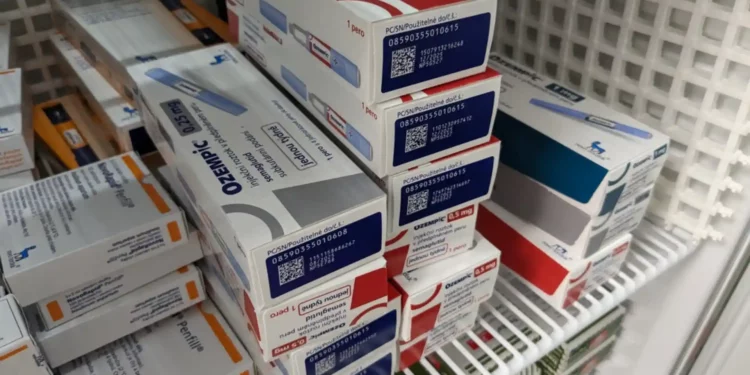The United States Customs and Border (CBP) seized 11 shipments of counterfeit Ozempic at Cincinnati airport, Ohio in May this year.
The growing demand for weight loss drugs called GLP-1 agonists has been a game changer all around the globe. This includes Ozempic, the famous drug semaglutide which is better known by the brand it comes from and the more potent Wegovy. These drugs play a vital role in helping people lose weight, be healthy and feel confident.
The popularity comes with a drawback. The increasing demand and higher price tag have resulted in an increase in counterfeit versions of the drugs, causing hospitalizations all around the world.
One such case involves Mike Benson, a resident of Chicago who went into a coma after taking a fake version of Ozempic drug. Michele Sword, a mother of two from Oxfordshire, England, had hypoglycemia and seizures that required her to be hospitalized.
There are many such incidents that have taken place which have regulated two concerns. One being counterfeit medications while the other is what is causing consumers to take the risk.
The United States Customs and Border (CBP) seized 11 shipments of counterfeit Ozempic at Cincinnati airport, Ohio in May this year. It is known to be on the nation’s key operations hubs. The shipment had more than 100 injections each marked to be delivered in locations across the US and spread from New York to Texas. The seizure was valued at around $887,000 according to the CBP.
A similar incident came into light at Chicago O’Hare International Airport last month.
There was a suspension of fake Ozempic in Lebanon, Beirut almost 10,000km (4000 miles) away as there were a dozen instances of extreme low blood sugar in patients. One of which needed to be hospitalized in November.
British officials seized counterfeit versions of the medication in October. They were imported from trusted and legitimate suppliers from Austria and Germany. This gave the idea of the challenge emerging from down the supply chain.
The Austrian court made an announcement of taking legal action against the sellers of fake drugs to a plastic surgeon in Salzburg. That is consistent with a claim published late last month in Vanity Fair magazine, which stated that some counterfeit doses got up in the hands of legitimate medical clinics without their awareness.
Many such similar reports have been heard from Brazil and Russia as well.
McAfee discovered hundreds of fake Craigslist listings for Ozempic dosages. The business also discovered cases of fraudsters impersonating doctors on Facebook. According to McAfee, if these scammers do deliver on their claims, they frequently ship counterfeit medication, such as saline solution-filled pens and EpiPens.
Consumers have approached Reddit groups like the since-banned Ozempic Source USA where the consumers sold the drug to each other.
WHO sent warnings about the unpredictable health risks and complications that are derived by this falsified drug.
The US has been the market for 71% of Novo Nordisk’s GLP-1 agonist drugs. The company charges Americans an average of $936 for a month’s supply. This amounts to five times more than Japan which sells it at $169.
The supply is said to be low. There has been a shortage of supply since March 2022 of semaglutide injections. This occurred due to a combination of factors like high demand and low productions.
Novo Nordisk charges comparatively lesser than other countries including the equivalent of $186 a month in Denmark for the drug. The success of Ozempic made Novo Nordisk one of the most valuable companies in Europe with a market capitalization of $570 billion. This makes it bigger than the entire Danish Economy.
While Novo Nordisk is making efforts to increase their production the company is doing nothing to reduce the prices which also includes not providing pharmacies the chemical compound to make generic forms of the drug.
This is done at compound pharmacies. Unlike traditional pharmacies, which offer pre-packaged pharmaceuticals from pharmaceutical corporations, compound pharmacies create their own versions from raw materials purchased in bulk at a cheap price. The drug is mixed on-site by a pharmacist. In this scenario, Novo Nordisk refuses to supply these pharmacies with their ingredients, but some continue to manufacture replicas of their weight reduction and anti obesity medications.


















